2024 has been an intense year for Magic: The Gathering. From the release of expansions like Modern Horizons 3 to controversies involving card design or the end of localization in Portuguese, there was no shortage of heated moments that increased the debate around the most famous TCG in the world.
In this article, we take a look back at the main moments of 2024 in Magic: The Gathering and what were the main hits and misses of Wizards of the Coast and the game throughout the year.
The Hits and Misses of Magic in 2024
Ad
Hit: The story of Jace, Vraska and Loot
Magic's lore is one of the many elements that are undergoing changes. In addition to the design perspective, the game's story now addresses the Omenpaths, who basically gave the entire Multiverse the awareness that other worlds exist, with exploration between them being a recurring theme.

Throughout the post-Phyrexian Invasion arc, we followed Kellan as he traveled between planes searching for his father, Oko, who was ultimately plotting a plan in Thunder Junction to recover a priceless treasure - this plot, however, unfolds in a new and perhaps the most important twist that Magic has had in recent years: Jace and Vraska had a plan, and it involved recovering a child of an ancient race, the Fomori, encapsulated in this treasure, Loot, a small creature that operates as a living map of the multiverse.
The way Wizards approached this part of the story was their biggest lore highlight this year: the story flashes back to the Phyrexian Invasion, where we see Jace and Vraska recovering from the Phyresis infection and suffering from the pain and aftereffects of the disease while watching the Omenpaths open up, concluding that they need to do something about it, even if the price is too high.
When they meet Loot, however, the couple feels, perhaps for the first time, like a family. What would be an instrument becomes a child, someone worthy of protecting, loving, and accompanying on their journey of growth. There are countless moral dilemmas that Jace and Vraska may face from this point on, and so seeing how Magic will develop this plot is one of the events we're most looking forward to in 2025 and 2026.
Miss: Too many references in the sets
Much of the discussion about Universes Beyond revolves around a recurring problem that Magic has been facing throughout 2024, and which has already shown signs of occurring since 2020: there is an identity crisis in the game.

During the entire year, we've had expansions that felt like stereotypical versions of some mainstream product and crammed with references to the point where they weren't even fun anymore. A coyote and roadrunner card in Thunder Junction went from being funny to cringe, the number of characters wearing detective hats in Murders at Karlov Manor seemed like a collective delusion, and we don't even know where to start with the references in Duskmourn.
In the midst of all this, the lore was lost. Duskmourn, for example, has an entire story about Nashi's search for his mother's spirit that isn't even discussed in depth on the cards, Loot was captured by Valgavoth, and no part of the expansion tells this story because there's too much room to reference Freddy Krueger, the Ghostbusters, Scooby-Doo, or any other trope from classic horror movies from the 80s and 90s.
Ad
In theory, Hasbro is trying to make its product so cool that it ends up cringe and loses all the worldbuilding and rich narrative that Magic: The Gathering has to offer and that could be explored and amplified in other media.
Hit: Universes Beyond is legal in all formats
The Universes Beyond project aims to bring IPs and brands from outside the Magic: The Gathering lore to the card game. The proposal proved a success with Lord of the Rings: Tales of Middle-earth in 2023, and there was no doubt that it would continue to happen - Final Fantasy and Marvel were announced in the same year.
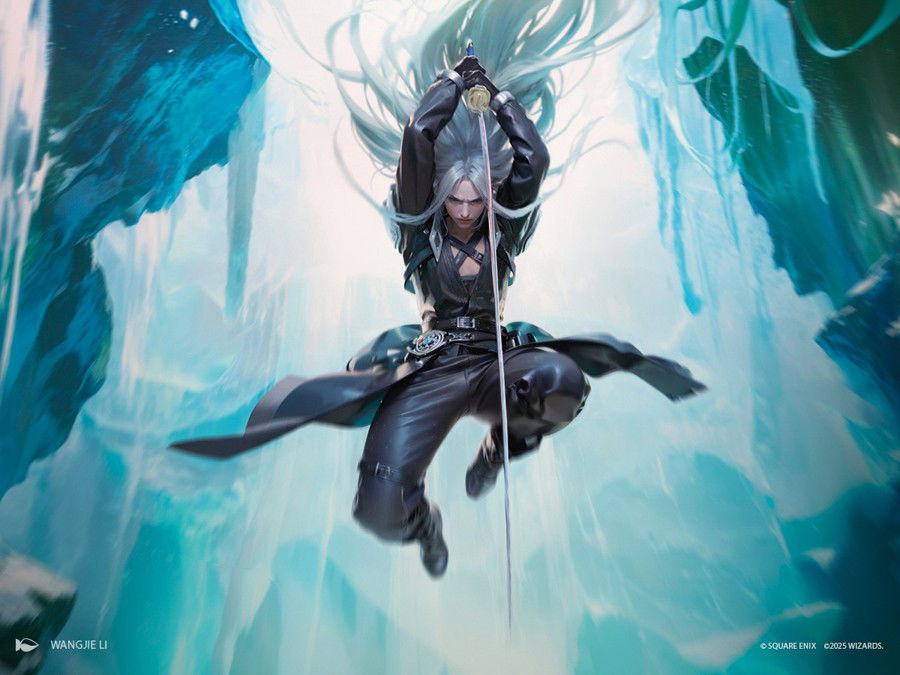
However, Lord of the Rings has a problem for the demographic of people who knew Magic and/or were interested in the TCG, as it either put them straight into Modern or limited them to Commander. Anyone interested in Magic as a competitive game and who wanted to participate in tournaments had to not only invest an absurd amount of money to play Modern, but if they wanted to have a real chance of winning, they would have to give up the cards from the brand that brought them to the game.
Making Universes Beyond legal in Standard helps, in part, with this problem: the power level is lower, the cards are more accessible, the decks are easier to understand and participation in local and competitive events has more archetype diversity, making the Magic: The Gathering environment more inviting for this audience.
Miss: Three Universes Beyond sets in one year
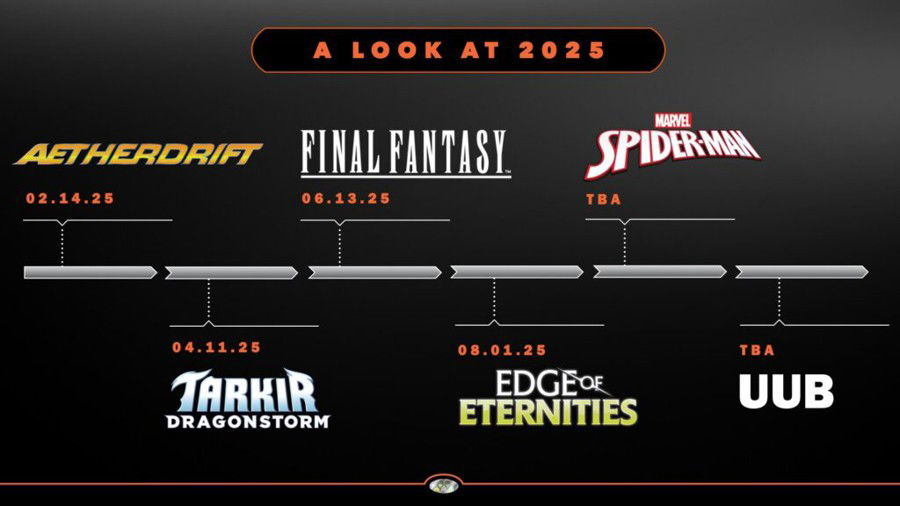
The idea of Universes Beyond is to attract audiences from other franchises to Magic. It works, MTG still has the best card game system in the world and in an economy where this niche is on the rise and more and more brands are producing their own TCGs (League of Legends announced its own tabletop card game for 2025), it is natural for a company like Hasbro to talk to brands and say something like “look, we have the system, and it has worked for 30 years, you just need to give us permission” - it works.
At the same time, like every Magic product, Universes Beyond runs the risk of saturation: Wizards has had the modus operandi of overloading its consumers with more and more of different product categories in recent years until they burn out. Examples include Commander Decks, Secret Lair, different foil treatments, alternative illustrations, full art lands, among others - now, the new “hype” of the moment runs the same risk because Magic announced three Universes Beyond expansions in one year.
Final Fantasy fans will be treated to a few months when FF will be the only IP outside of Magic to be present at tournaments, but Marvel and whatever third expansion the series releases in 2025 will have to deal with more frequent situations where Doctor Octopus will fight Sephiroth while the opponent taps a Crystal to summon Miles Morales. This can cause fatigue for these new players, and an even worse feeling for those who have been playing Magic for a long time.
Ad
For this reason, Wizards' announcement that half of its 2025 releases will be Universes Beyond should be a warning sign for players and, perhaps, for the company itself. This series needs to be special to matter in the collective imagination, it needs to occur with some distance between one release and another to give new audiences the opportunity to digest the rich universe in Magic, and putting several releases in such a short space of time can not only take away the importance of these collaborations for fans of both brands but also give the impression to audiences outside the TCG that Magic is just a “Fortnite” as a card game.
Hit: Secret Lair x Monty Python

The Best Secret Lair ever, the best crossover that Magic could do with the Universes Beyond project.
Miss: Announcing Secret Lair x SpongeBob on the same day as announcing all the plans for 2025
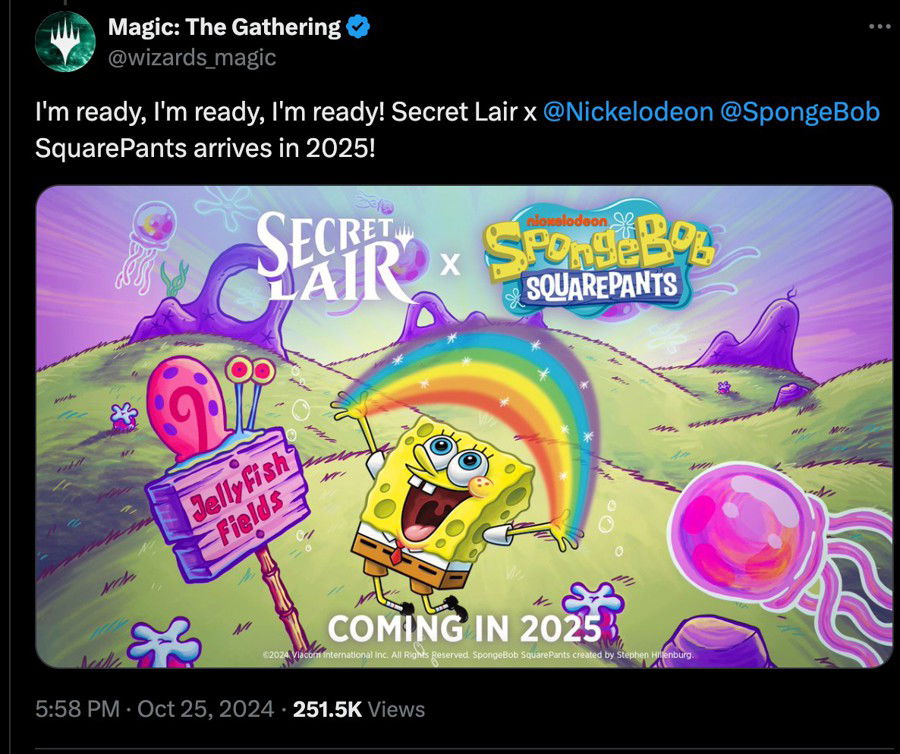
Not happy with announcing the change in legality of Universes Beyond and the decision to make half of the 2025 expansions crossovers, Wizards of the Coast decided to introduce Secret Lair x SpongeBob on the same day. If a portion of the players were already skeptical about these decisions, putting this product in the middle of them made Magic seem like a dystopian parody of itself that day.
Hit: Putting Standard at the epicenter of competitive Magic
For many years, Standard was the heart of Magic: everything went through it, everything was initially tested for it, the best way to meet new players and participate in events was through it, and if you wanted to advance in a competitive career, it was your best gateway.
Years passed, new formats emerged, and eventually, Standard was no longer the most popular format. Magic adapted, the pandemic came, and the format disappeared from local stores and had trouble returning to the spotlight. It was necessary to give players a reason to invest in Standard and the security that it was worth buying cards for the format - two elements that the company lost during social distancing.
The first step was to increase the longevity of the expansions, a double-edged sword since, on the one hand, this increases the security of investment for players while, on the other, it makes the format more stale since more powerful cards and more robust mana bases stay in the Metagame for longer, giving relatively little space for new cards and/or forcing Magic's design to keep the power creep high enough, but not too high.
The most important part was the second step: giving players a reason to be interested in Standard. Most of the 2025 RCQ and RC seasons will be in the rotating format, and the Spotlight Series will also have editions focused on Standard, creating a scenario where it is very worthwhile for those who can attend these events to play again.
Standard needs to be the epicenter of Magic: many problems we find in other formats only occur because new, powerful cards are inserted directly into them, and creating more expansions that go through the Standard scale first makes Magic a safer, more contained game, and whose other formats do not suffer from as many potential interventions as they have suffered lately.
Ad
Miss: Leaving Pioneer in limbo
Wizards is right to give more relevance to Standard next year, but is deeply mistaken in not giving space to the most plausible format to transfer players to when its cards rotate: Pioneer.
With no RCQ or RC season for Pioneer in 2025, several players and content creators are already saying that it is not worth investing in or playing the format, and given the poor popularity it has already had due to the long periods in which it was in unstable Metagames, it is possible that Pioneer will never recover from this year.
Pioneer will need to maintain high levels of engagement from the company and the community to keep it relevant, and if that doesn't happen, its fate could be the same as the late Extended, which was eventually replaced by Modern and relegated to the limbo of competitive Magic history.
This coming year, however, could be the opportunity Wizards needs to “fix” Pioneer and make it more attractive. Without the risks that an RC season brings, more assertive bans could occur more frequently, and some cards could even go into experimental phases to determine whether they can return to the format and/or whether some historical staples like Treasure Cruise and Fable of the Mirror-Breaker should leave the format.
Hit: Pioneer Masters
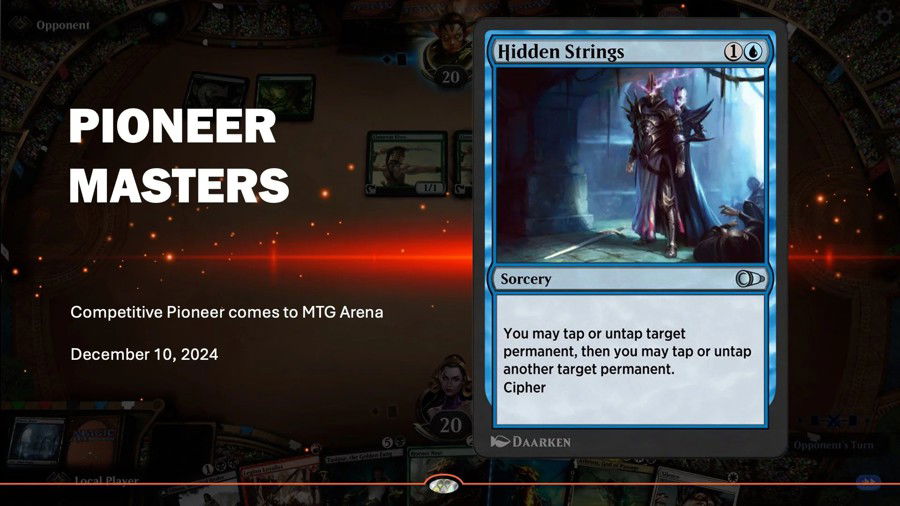
After more than a year since its first announcement, Pioneer Masters arrived on Magic Arena and brought a dozen staples of the format that were not on the digital platform, such as Hidden Strings and Reckless Bushwhacker, making the Explorer format 99% similar to its tabletop version in Pioneer.
Some notable exclusions include Sanctum of Ugin and Goblin Piledriver, as well as some Eldrazi from Oath of the Gatewatch, but most of what is viable and competitive in Pioneer, plus a few interesting additions, are now available on the digital platform and can help keep the format relevant during this “limbo”.
In addition, Magic Arena’s sample size is much more relevant both for ban data and for players themselves to train for tournaments.
Miss: Nadu, Winged Wisdom

Wizards’ most admitted mistake and one of the most controversial cards of the year, Nadu, Winged Wisdom has made Modern, Legacy, and Commander miserable play experiences. Its problem lies in how its ability triggers twice per turn and for any spell or ability, even those controlled by its owner.
With Shuko and a robust shell of creatures and tutors, Nadu quickly dominated Modern and became the most oppressive archetype in the history of Pro Tours in the format, having a win rate and meta share higher than even Hogaak, Arisen Necropolis while presenting the opposite problem to Hogaak: Hogaak ended games too quickly for any response to work, while Nadu was too resilient and had an indeterminate play pattern that forced its controller to repeat the loop until the opponent decided it was possible to win the game.
Ad
Upon being banned, Michael Majors, lead designer of Modern Horizons 3, made a post on Wizards' official website where he explained Nadu's design process and commented on how his most recent iteration was created because the team wanted an attractive card for Commander, and there were concerns that one of his previous abilities was too strong for the format - an ironic twist of fate, given that Nadu was also banned from Commander for creating a poor gameplay experience.
Hit: One of the best years in Standard's history
The 2024 expansions for Standard were some of the best in the format's recent history, and with the rotation that removed the New Capenna lands, there was plenty of room for new archetypes to emerge.

From the rise of red Aggro with Slickshot Show-Off and its more synergistic iterations with Blomburrow’s mice package, the Token Control lists with Caretaker’s Talent, the new Ramp variants with Overlord of the Hauntwoods and the recent iterations of its cycle with Zur, Eternal Schemer, the rise of Azorius Tempo with Abhorrent Oculus or even the various combos that have emerged with Unstoppable Slasher, Doomsday Excruciator, Standard as we know it in 2024 is one of the most diverse in recent Magic history and presents a healthy relationship between all macro-archetypes present in a competitive format.
Miss: The worst year for Modern
Modern Horizons is a set already known for messing up the Modern Metagame and completely changing the relationship between the best decks in the format. When Modern Horizons 3 came out, perhaps no one expected its impact to be more damaging to the competitive scene than that of MH2, but it took just a few days for Nadu, Winged Wisdom to become the best deck in the format and players spent a few weeks with a terrible meta.
Nadu was eventually banned along with Grief, another problem card whose potential to “anti-play” was tied to the possibility of playing it on the first turn and reviving it with Not Dead After All and the like to remove two key cards from the opponent’s hand before they had a chance to play it - but that wasn’t the end of Modern’s problems.

MH3 also messed with two dangerous mechanics: Energy is a parasitic ability that is difficult to interact with, and even for Modern’s extensive card pool, the answers to the archetype are too linear or inefficient, and all it took was finding the right package of cards - almost all of them from MH3 - to make Boros Energy the absolute best deck in the format, with numbers that were close to 40% share.
On the other side of the spectrum, the Eldrazi also gained the spotlight after the infamy they gained with Oath of the Gatewatch and the famous Eldrtazi Winter in Modern. The mix of a non-interactive game plan, the extra mana from Ugin’s Labyrinth, and the interaction of these archetypes with The One Ring established another major threat to the metagame and diversity of the format.
Ad
Hit: The return of the Grand Prix
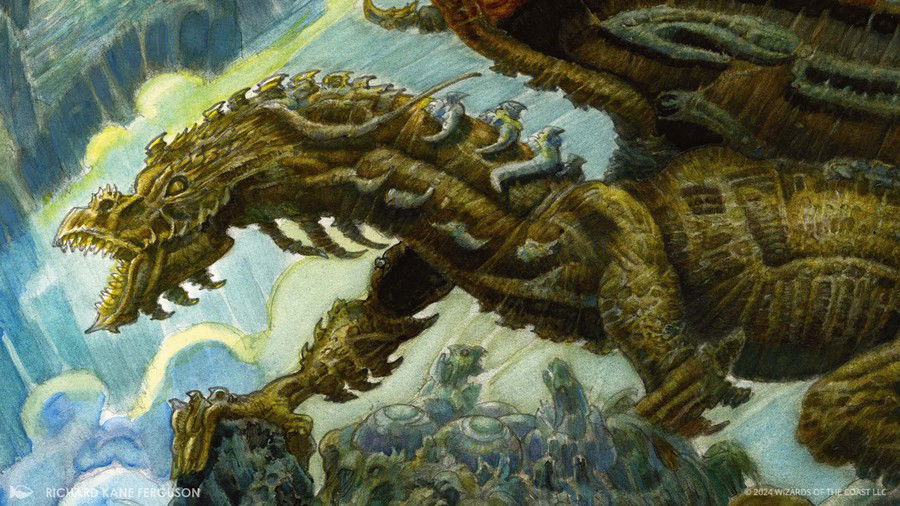
The Magic Spotlight Series is a series of competitive events that will take place during 2025, each with a specific theme and having, basically, a structure very similar to the old Grand Prix, each with a prize pool of $50,000 and eight invitations to the current Pro Tour.
With the reconstruction of competitive Magic, Wizards gradually created a new structure that seemed satisfactory for those who wanted to follow this path, but there was still a lack of opportunities to participate in more large-scale events throughout the year, and the Spotlight Series fills this gap that was left by the Grand Prix, both for competition and for the Gathering.
Miss: Abandoning Latin America
There are two ways to look at the end of the Portuguese localization of Magic in 2024: from an abstract point of view, and as a Latin American.
From a more abstract perspective, Wizards decided that the numbers presented by the sale of products in Portuguese were below expectations and did not compensate for the printing costs. In fact, as mentioned by the company in the official announcement, players from the demographic that mattered in this equation prefer cards in English, which is a broad reality for the Portuguese public, since the exchange and sale of cards in English is easier when they need to travel to other regions of Europe - It is a marketing and commercial decision, of numbers, of profit, like any other.
For the rest of the world, it seemed - and is - more shocking that Wizards chose to remove the Chinese localization on the same day. After all, China is now one of the greatest commercial powers in the world. For Brazil, the end of the Portuguese localization was the nail in the coffin that had already been announced since the closure of the Wizards' office in Brazil, back in February 2023.
In the following months, with the announcements of the Spotlight Series and other events around the world, the feeling for the Brazilian player and, perhaps, for a part of Latin America that does not speak Portuguese is that we no longer have the attention of Wizards of the Coast, both for Magic: The Gathering and for Dungeons & Dragons. It is up to us to hold our events, it is up to us to keep the game alive, it is our responsibility to continue cultivating communities in a game that, in parts, is not looking out for us.
Without the personal touch of being a Latin player, this decision is a mistake given the proposal that Magic has adopted in recent years: to be a more inclusive game, to be a place where people can come together and learn about a greater diversity of cultures, opinions, points of view and establish connections through the Gathering - Brazil and Latin America can and will continue to do this, but for our environment, there is a lack of motivators of which other TCGs are delivering better, and this can and already does alienate some players in our community to other products.
Ad
In addition, Brazil deserves a little more than what is being delivered. Two of our players have already been world champions (Carlos Romão and Paulo Vitor Damo da Rosa) and we have two in the Hall of Fame (Paulo Vitor Damo da Rosa and Willy Edel). We left our mark on Magic's history and, particularly, we deserve a little more as a community.



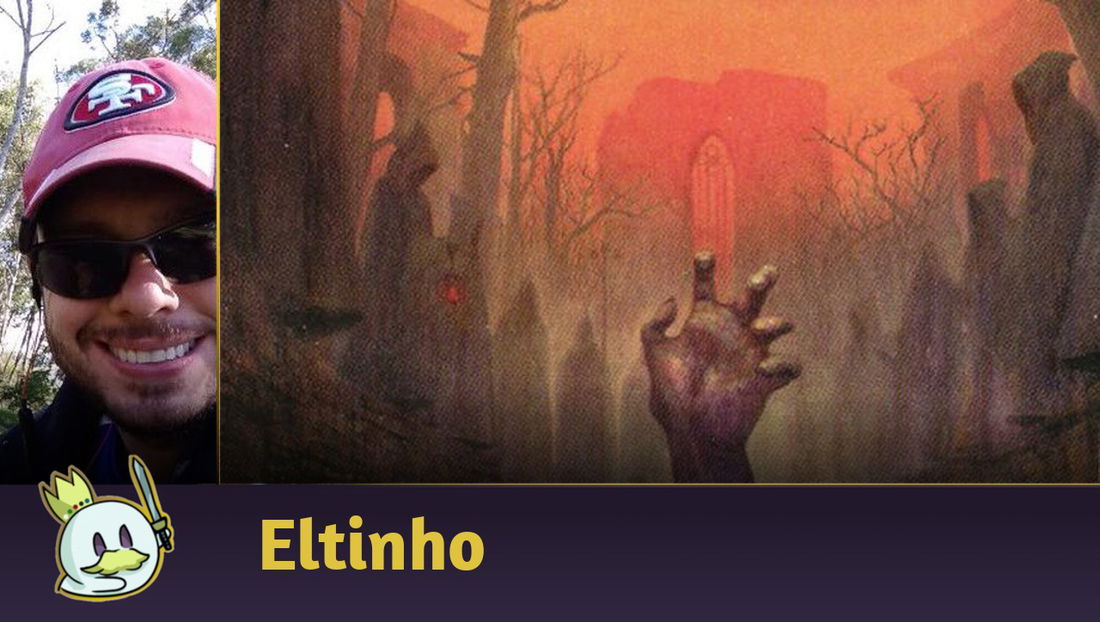
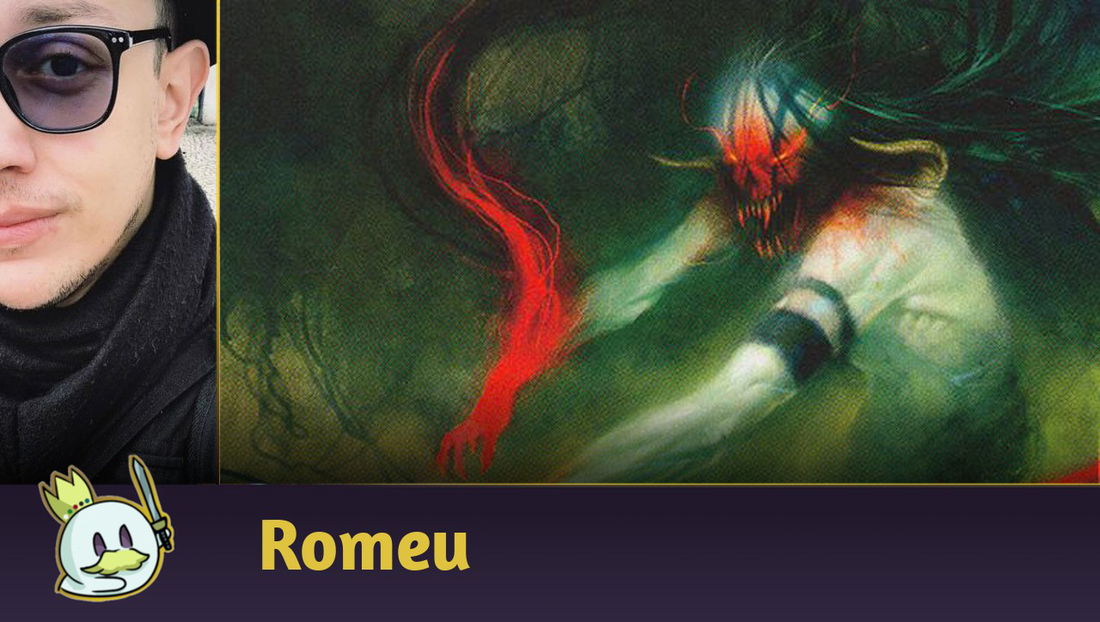



— Comentarios0
Se el primero en comentar